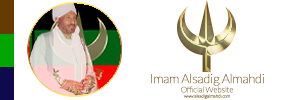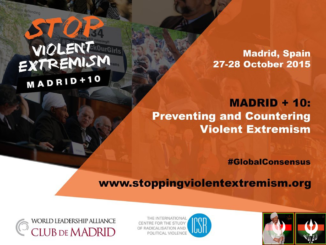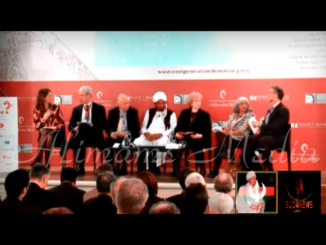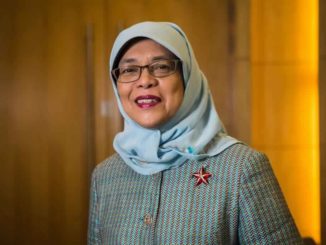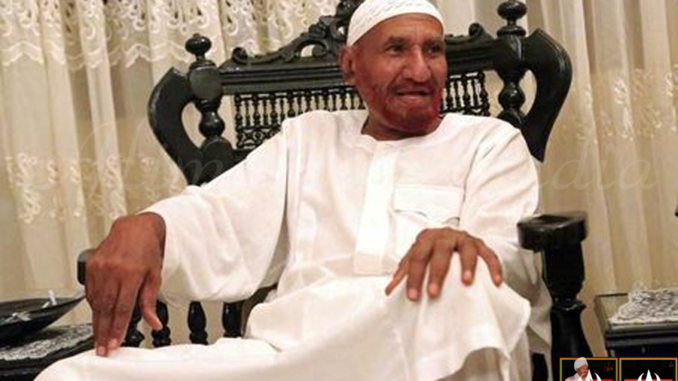
In an interview with Azzaman on the 29th September 2014, Sudan’s Umma Party leader Sadiq al-Mahdi discusses the problem Sudan is facing, and his hopes that with sustained dialogue between all parties, the best solution for the Sudanese people can be achieved.
Translated by:- Pascale el Khoury
2 October 2014
Sudanese President Omar al-Bashir has put forward an initiative to start a national dialogue in a striking development that foreshadows a political breakthrough in the crisis that has been deepening for several years in Sudan. The dialogue is to bring together the various political forces to reach a consensual solution to preserve the country’s unity and avert the risk of foreign intervention.
Amid the preparations for this conference, Sadiq al-Mahdi, leader of the Sudanese Umma Party, gave an interview to Azzaman and expressed his opinion about the current developments.
Azzaman: What do you think of the reasons that prompted the Sudanese regime to put forth a national dialogue initiative at this time? Do you think it’s maneuvering on the part of the regime? What are the odds of its success?
Mahdi: The entire region is plagued by crises that differ from one country to another. We all have the same concerns. Consequently, we have raised, in the Umma Party, and after the secession of South Sudan from the north, a project to bring a new regime in Sudan through peaceful means and away from violence, because any attempt to forcibly exclude the regime will only result in countereffects. We said that the best way to achieve this step is either through a dialogue that does not exclude anyone, as happened in South Africa in 1992, when the dialogue was dubbed as the Codesa negotiations, or through the mobilization of the Sudanese people for a peaceful uprising. At the time, however, the regime did not respond.
At the beginning of this year, the head of state put forth an initiative called the Wathba initiative for national dialogue in order to reach an agreement. I believe that several factors prompted the head of state to put forth this initiative at this specific time, including the fact that the regime tried to address the economic hardship by imposing taxes last September. However, this led to a popular uprising that claimed the lives of 200 martyrs, while the economic situation is still dire because the country is marred by fighting on six fronts in the context of a civil war dramatically draining the regime.
The regime is facing 61 international resolutions against it, most of which fall under Chapter VII, which describes the Sudanese regime as a threat to the world order and security. These factors formed a siege on the regime, and it sought to get rid of it by putting forth the idea of a national dialogue, and we, in the Umma Party, consider that this step is correct and we welcomed the idea. However, it turned out that the regime was not willing to do what it takes for this dialogue to succeed, and we expressed our observations about this initiative.
The dialogue should be under neutral chairmanship, a point that the regime expressed reservations about. There ought to be freedoms so that the participants in this dialogue be safe, but these freedoms are yet to be guaranteed. The dialogue, in its version related to the Wathba initiative, is useless because the regime is not ready to do what it takes for the required dialogue to succeed. In the meantime, we were talking with the Sudan Revolutionary Front in Addis Ababa, which was determined to overthrow the regime by force and give regions of Sudan the right to self-determination, as happened in South Sudan. Together, we came up with the Paris Declaration, which set a new base for the Sudanese affairs.
Azzaman: What are the most important items of the Paris Declaration? Do they set the stage for a solution to the problem of Sudan?
Mahdi: The Paris Declaration included several significant items that can constitute a valid basis to resolve the crisis, including looking for a new regime through peaceful means and the establishment of a fair regime. … The declaration combined the most powerful forces of change in Sudan and consequently established a new balance. It secured the mediation of the Arab League after this mediation had been confined to the African Union.
The African Union countries, which are Sudan’s neighboring countries in the Horn of Africa, showed interest in the Sudanese affairs and followed up on them, and we called for the need to introduce Egypt to this equation, being a neighbor of Sudan. These five meanings represent a big step toward bringing about soft change. However, the Sudanese regime rejected them at the beginning, but Thabo Mbeki, the African Union mediator, called on all parties tackling Sudanese issues to a meeting in Addis Ababa. The meeting was attended by a delegation representing the Sudanese regime, and the discussion led to an agreement called the Addis Ababa Document, which is almost similar to the Paris Declaration but with certain modifications. There is no doubt that this is a step in the right way.
With the consent of all the parties to this agreement, the African mediator transferred what was agreed upon to the African Union’s Peace and Security Council, which approved these steps and re-delegated [Mbeki] to find with all Sudanese a final step toward achieving peace, and discussed with them the agreed upon regime. He then transferred this development to the UN Security Council, which in turn agreed on it. We, in the Umma Party, are currently preparing a paper we called the road map, and we will send it to the African mediator. This paper includes our vision about the dialogue on the future of governance and an agreement on the future of peace in Sudan. We will also send the paper to the allies of political powers.
Azzaman: In light of these developments, do you expect the conference to be held and lead to the desired outcomes that restores stability to Sudan?
Mahdi: Everything is possible in politics, but the regime is facing a crisis, and we hope that the regime will be responsive in order to find a solution to the crisis. Although there is currently no country in the region devoid of a certain crisis, Sudan remains the closest to getting out of its crisis, unlike other areas. Sudan’s mechanisms of searching for an exit are just around the corner.
Azzaman: If an agreement is reached, will you request guarantees for its implementation, especially as the regime has precedents in this area?
Mahdi: We believe that if the conference is held, decisions will be taken on the appropriate actions with the required guarantees since what will be agreed upon will be implemented. ِWithin the scope of the road map, we will ask all concerned parties inside and outside the region to attend this meeting and examine what was agreed upon in terms of ruling and peace in their capacity as observers and witnesses. This all falls within the scope of the guarantees required to achieve the Sudanese peoples’ aspirations.
Azzaman: Do you believe the release by the Sudanese regime of a number of detainees, most notably Mariam al-Mahdi, is an important step contributing to the success of the dialogue?
Mahdi: These are all part of the Paris Declaration demands. They are steps toward the desired solutions.
Azzaman: Do you think other divisions will occur, as was the case in the South, if the Sudanese regime maintains its current policies?
Mahdi: This can happen not only in Sudan, but also in the region. This is not the result of a conspiracy theory, but the outcome of the failure of political leaders. Negative aspects breed conspiracy, since foreign entities cannot create or fabricate events in our reality. The internal mistakes are the reason for these crises and foreign entities exploit these flaws.
Azzaman: What is the truth behind the accusations made by the legitimate Libyan government against the Sudanese regime of smuggling weapons to opposition Islamic militias?
Mahdi: Regardless of the veracity of these accusations, we must be aware that the Sudanese regime is controlled by the Muslim Brotherhood. Currently, the conflict in Libya is between the old parliament, controlled by the Brotherhood movements and the new parliament, currently meeting in Barqa and including only 10 MPs affiliated with the Muslim Brotherhood. This conflict will require external interventions given the Brotherhood components having a common origin with the Sudanese regime, which will certainly intervene in favor of those components. There are also interventions by other components in favor of the recently elected parliament holding sessions in Barqa. Moreover, Libyan authorities are raising demands for international intervention.
I think what is happening in Libya will inevitably lead to a continuous fighting by proxy, and if the Libyan situation is not addressed, this will lead to the establishment of tribal cantons and Islamic emirates, which will definitely require foreign intervention to achieve security and stability. I believe overcoming this impasse requires the prompt formation of a unified Arab army including all Arab stable countries, headed by Egypt and supervised by the Arab League mission. This army will be tasked with achieving security and stability in the Arab countries, combating current terrorism after agreeing on its objective definition and addressing the security issue at the level of the Arab region as a whole.
Azzaman: Do you think that the Sudanese regime, with a Brotherhood background, could constitute a suitable environment for extremist organizations similar to the Islamic State (IS)?
Mahdi: Sudan now includes radical circles. For example, a cleric called Mohammed Ali al-Jazouli recently announced that he supports IS. Moreover, some groups pledged allegiance to IS and others to al-Qaeda. The importance of the dialogue we are holding lies in the fact that it prevents developments allowing the creation of IS or al-Qaeda emirates in Sudan, which will pose major security risks.
Azzaman: How do you interpret the closure by the Sudanese regime of Iranian centers under the pretext of spreading Shiism despite the special relations between Sudan and the Iranian regime?
Mahdi: The Iranian issue is not limited to centers spreading Shiism. As an Arab entity, we need an Arab-Turkish-Iranian security agreement initially dealing with all issues in order to agree on the possibility of peace and coexistence in this region and to put an end to all sources of tension. If these entities, which are deep-rooted in the region, do not coexist, they will surely harm each other and Israel will be the only winner.
Azzaman: How do you explain the declaration by the Sudanese regime that it will annex Halayeb and Shalateen to Sudanese voting districts despite the improvement in relations between Egypt and Sudan in the last period?
Mahdi: This is also an important issue that prompted me to write a letter to President Abdel Fattah al-Sisi calling on him to agree on a strategy with Sudan. We have strategic relations where no party can dispense with the other, even if the Sudanese regime is controlled by the Brotherhood, since there are factors that require our coexistence, whatever the differences. This is not an issue of governments, but of peoples.
Azzaman: What’s your explanation of the Sudanese biased attitude to Ethiopia in the Renaissance Dam issue?
Mahdi: Egypt and Sudan committed a mistake by signing the 1959 agreement while excluding the Nile Basin countries. Every Nile Basin country has interests and therefore, the language of interests and rationality must prevail among us away from the language of force and conspiracies. I believe Egypt is moving in the right direction in this respect.
Azzaman: How do you see the future of Egyptian-Sudanese relations in light of the emerging differences?
Mahdi: I believe the continuation of the current Sudanese regime controlled by the Brotherhood will lead to strained relations with Egypt on a continuous basis. If the current situation of Sudan changes and a regime that represents the interests of the Sudanese people takes over, this will guarantee a stable relationship between Egypt and Sudan, far from any congestion.
Azzaman
